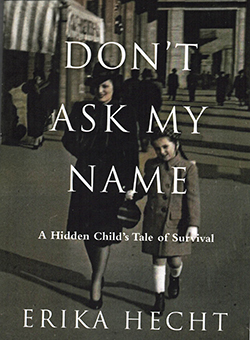Don’t Ask My Name: A Hidden Child’s Tale of Survival by Erika Hecht; (c) 2021, East End Press; ISBN 9781734-526837, 233 pages.
By Donald H. Harrison

 SAN DIEGO — Erika Hecht’s mother had herself and Erika converted from Judaism to Catholicism to protect them from discovery by the Nazis or their Hungarian allies, the Arrow Cross. Erika was enrolled in Catholic school, where she learned her catechism, but she remained aware of her Jewish parentage — especially since she remained close to her father and paternal grandmother.
SAN DIEGO — Erika Hecht’s mother had herself and Erika converted from Judaism to Catholicism to protect them from discovery by the Nazis or their Hungarian allies, the Arrow Cross. Erika was enrolled in Catholic school, where she learned her catechism, but she remained aware of her Jewish parentage — especially since she remained close to her father and paternal grandmother.
This memoir tells of Hecht’s identity crisis growing up — was she in reality Jewish or Catholic? — and her stormy relationship with her mother, whose fear for their survival deepened into a paranoia about behaving in such a manner that no suspicion would fall upon them. The mother’s intense desire to conceal her Jewish birth continued beyond World War II, even after the family left Hungary for relative sanctuary in Vienna, Austria.
Living as she did on a razor’s edge, the mother was sharply critical of her daughter’s behavior, rarely with just cause. No day seemed to go by without conflict. Erika matriculated through private Catholic boarding schools to Viennese medical school, where some of her Austrian classmates tried to describe their country as a victim, rather than a collaborator, of Nazi Germany. They also minimized the Holocaust, saying surely no Austrians could participate in such savagery. That led Erika to reveal her identity in an impassioned speech in which she described her former lifetime of hiding, running, and always being in fear of discovery. The reward for her candor was ostracism.
Although the emotional trauma of Holocaust survivors who traded their Jewish identities for a chance at survival is the main theme of this memoir, other parts also make compelling reading. For example, Hecht describes how her family was caught in Hungarian no man’s land between the battling Russian and German Armies near the end of World War II. That they survived the bombings and the carnage is truly an amazing story.
Hecht went on to marry a distant cousin who had immigrated to Canada and became successful enough in business to become an important philanthropist. Unfortunately that marriage fell apart, the victim of her alcoholism. There are other candid admissions in this book as well, making the veracity of the memoir all the more persuasive.
*
Donald H. Harrison is editor of San Diego Jewish World. He may be contacted via donald.harrison@sdjewishworld.com